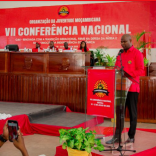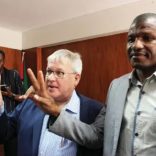Chapo stresses role of young Mozambicans in winning economic independence - Watch
Mozambique: New horizons opened with reform deal on election crisis – opposition

File photo: Noticias
Mozambican opposition parties on Wednesday emphasised the opening up of ‘new horizons’ with the signing of the agreement for state reforms, arguing that this is essential to overcome the problems of Mozambicans and the successive post-election instabilities.
“This political commitment opens up new horizons for Mozambique. Building consensus between the signatory parties is essential for resolving the problems identified as the epicentres of the country’s cyclical political, economic and socio-cultural instability,” said Albino Forquilha, leader of Podemos, representing the eight signatory opposition parties, after signing the agreement in Maputo.
The Mozambican president and Mozambique’s main political parties signed an agreement yesterday on the terms for state reforms, as part of the political dialogue to end the country’s post-election crisis.
The ceremony took place at the Joaquim Chissano Conference Centre, with the agreement being signed by the parties with parliamentary seats, namely the Front for the Liberation of Mozambique (Frelimo), the Optimistic People for the Development of Mozambique (Podemos), the Mozambican National Resistance (Renamo) and the Democratic Movement of Mozambique (MDM).
The extra-parliamentary New Democracy (ND), National Reconciliation Party (Parena), Social Renewal Party (Pareso), Humanitarian Party of Mozambique (Pahumo) and the Democratic Revolution (RD) also signed.
Although the Mozambican head of state has repeatedly promised to ” extend the dialogue table” to “various segments of society”, one of the main criticisms raised by academics and analysts continues to be the absence of Venâncio Mondlane, the second most voted presidential candidate in the 9 October elections, according to the Constitutional Council, and who is leading the worst contestation of the results the country has seen since the first elections in 1994.
Albino Forquilha, leader of the now largest opposition party – projected for this leadership by joining Venâncio Mondlane in these elections, despite the current distance between the two, said after the signing that the agreement aims to put an end to the constant post-election instability in the country, given the inability of state institutions to establish electoral justice, and to affirm a democratic rule of law.
“We, the opposition political parties, believe that, with the signing of the political commitment, the conditions have been created so that the different political actors, the different institutions and Mozambican society can participate in this fundamental and necessary dialogue to chart paths towards a Mozambique united in diversity,” he said.
The Podemos leader once again criticised the post-election demonstrations with deaths and destruction.
“We cannot normalise the disruption of public order, the disruption of the normal movement of people, goods and services, because this has a direct negative impact on the daily lives of all of us,” he said.
Mozambique has been experiencing a climate of intense social unrest since October, with demonstrations and stoppages called by former presidential candidate Venâncio Mondlane, who rejects the election results of 9 October, which gave victory to Daniel Chapo.
The protests, now on a smaller scale, have been taking place in different parts of the country and, as well as contesting the results, people are complaining about the rising cost of living and other social problems.
Since October, at least 353 people have died, including around two dozen minors, and around 3,500 have been injured during the protests, according to the electoral platform Decide, a non-governmental organisation that monitors electoral processes.
The Mozambican government confirmed at least 80 deaths, as well as the destruction of 1,677 commercial establishments, 177 schools and 23 health centres during the demonstrations.












Leave a Reply
Be the First to Comment!
You must be logged in to post a comment.
You must be logged in to post a comment.